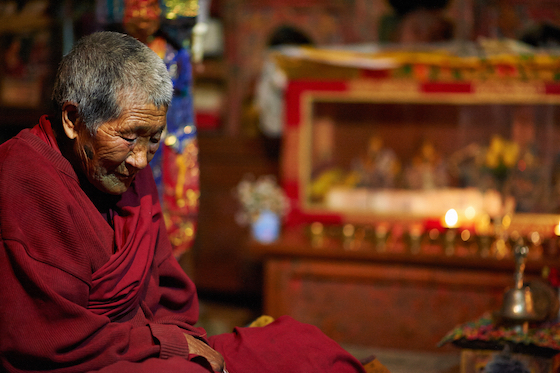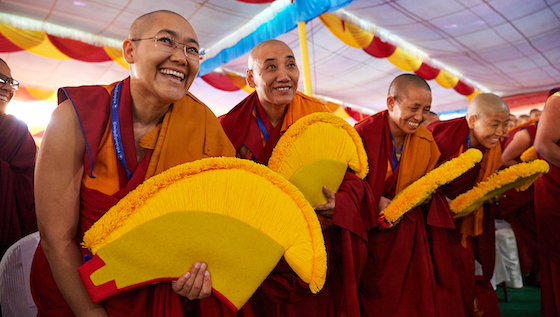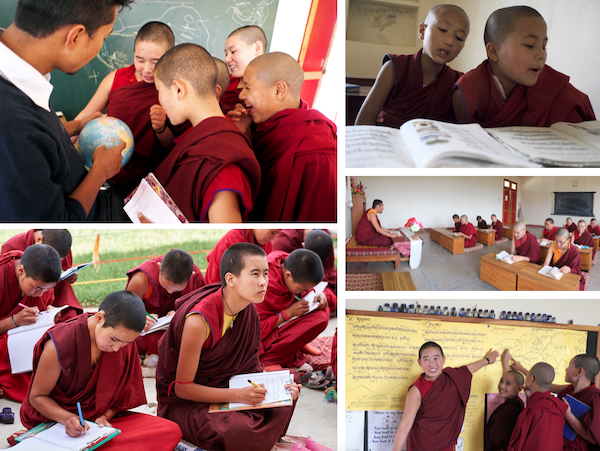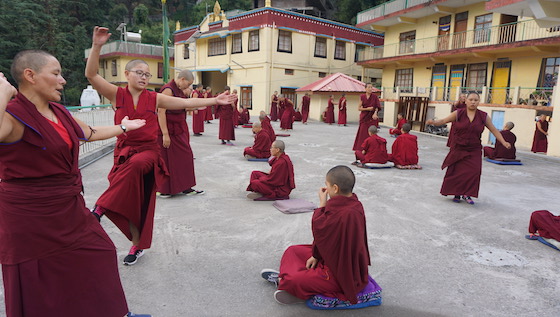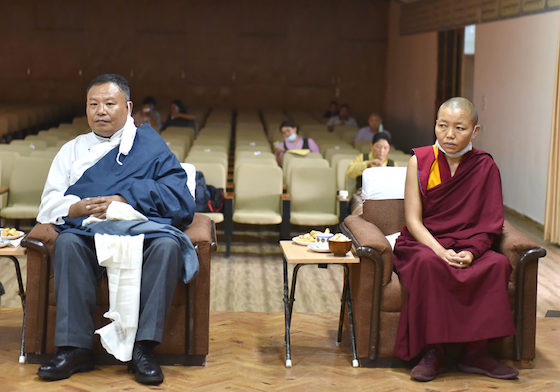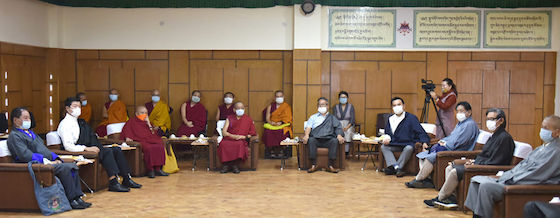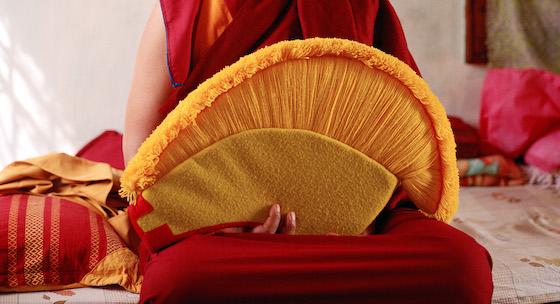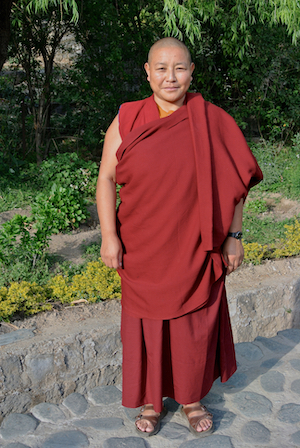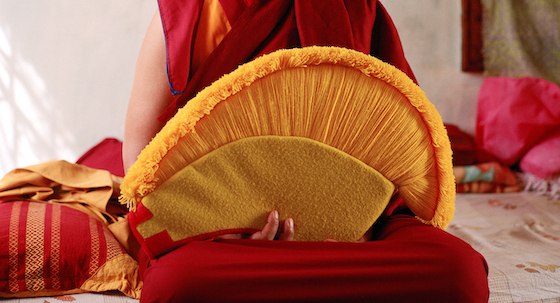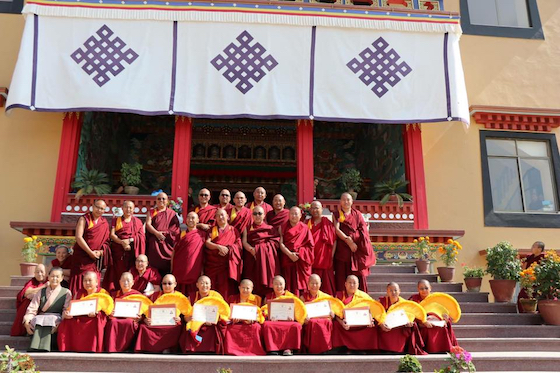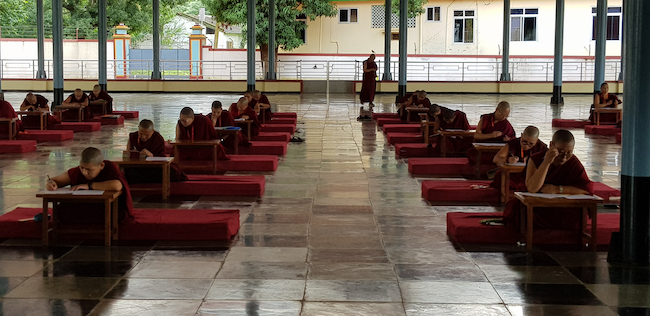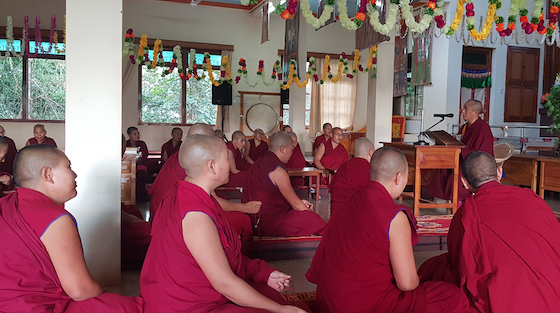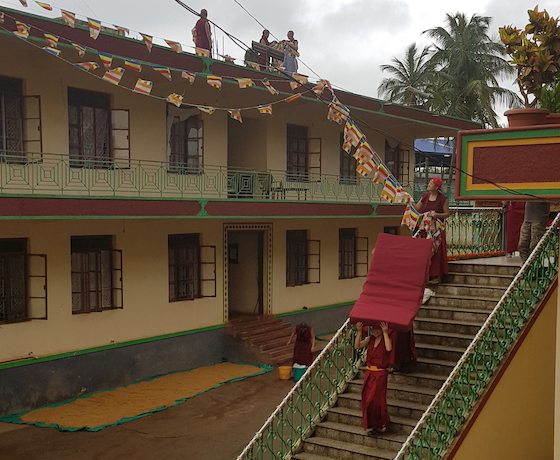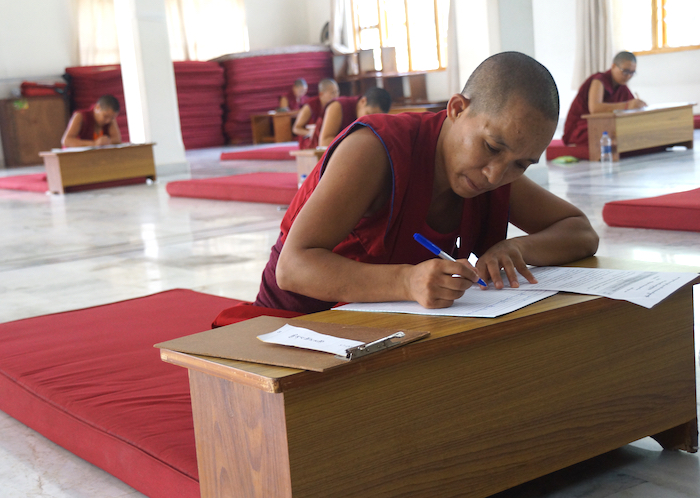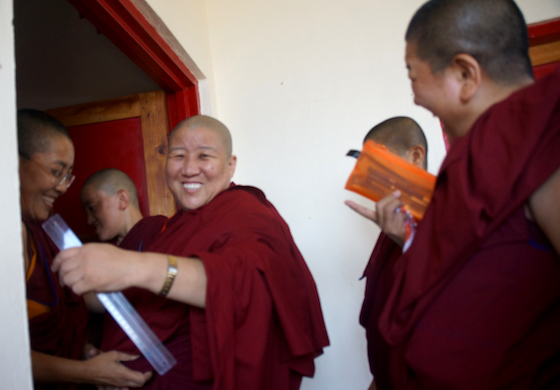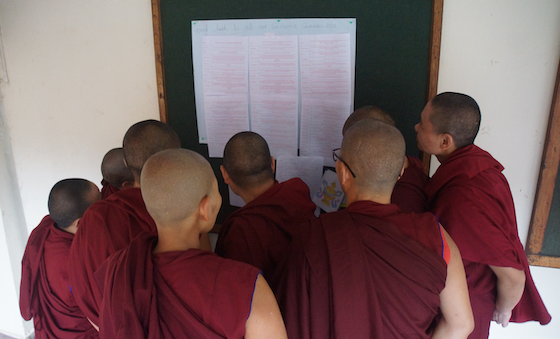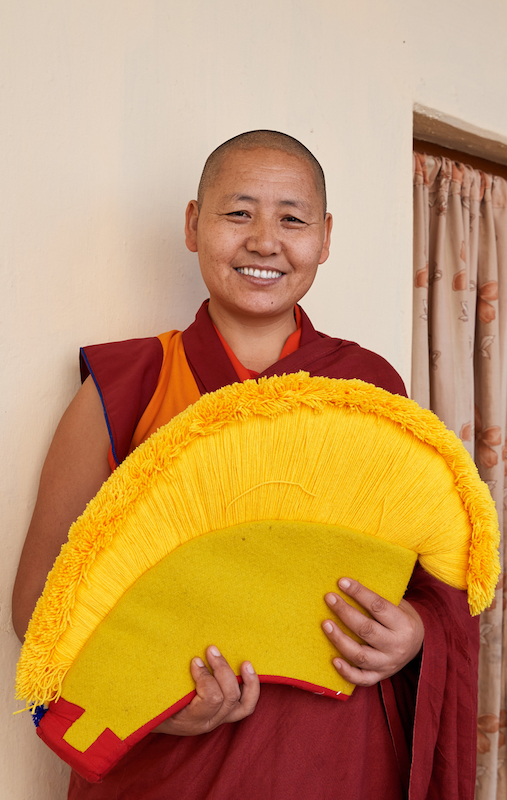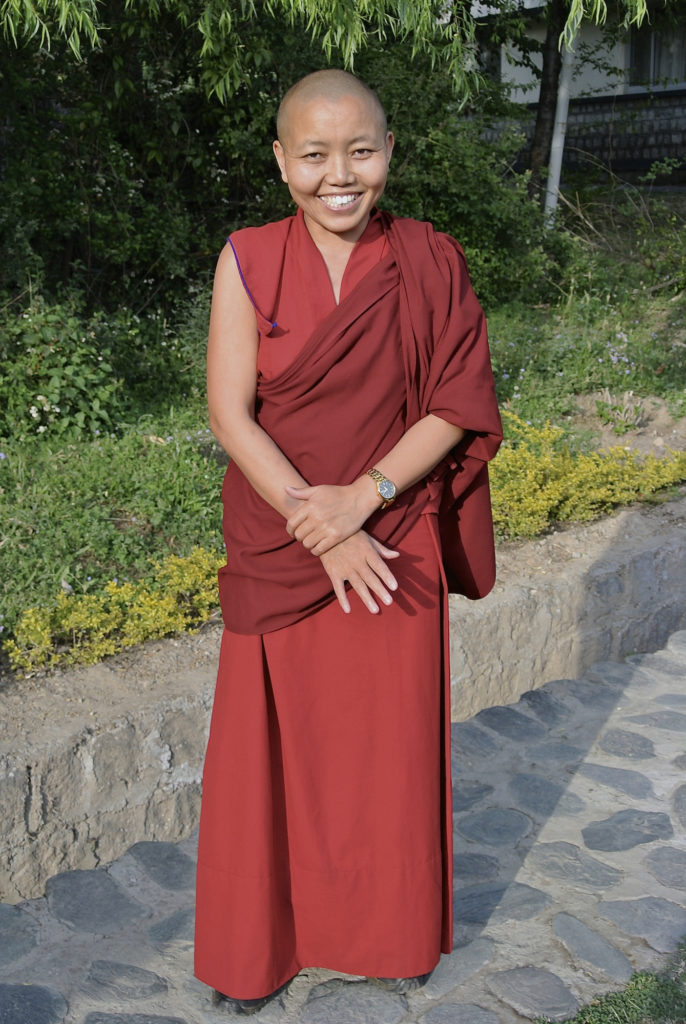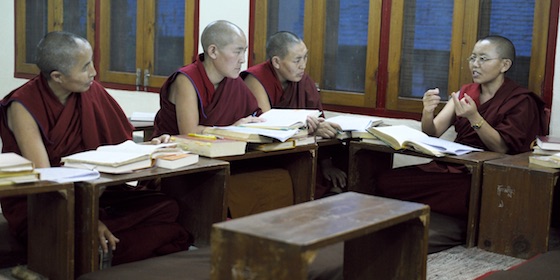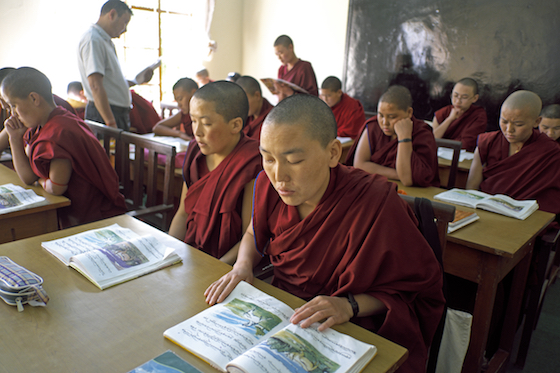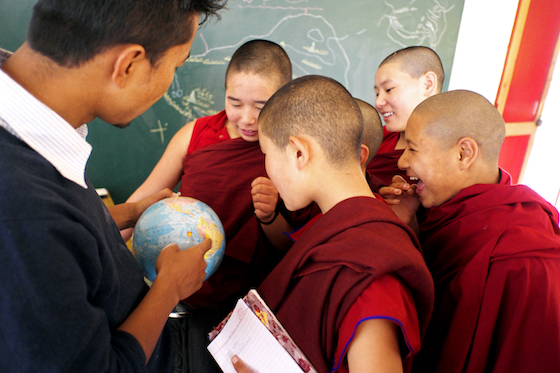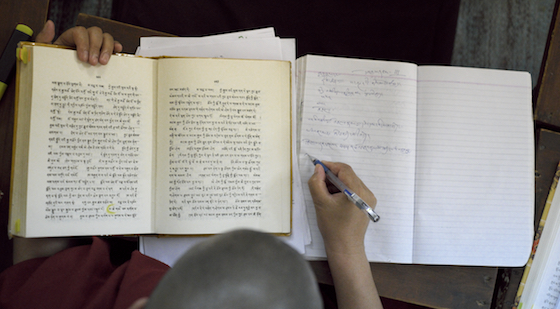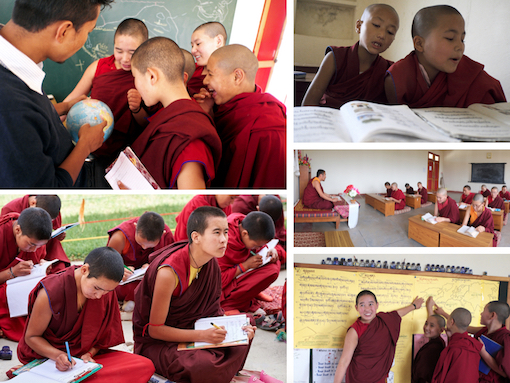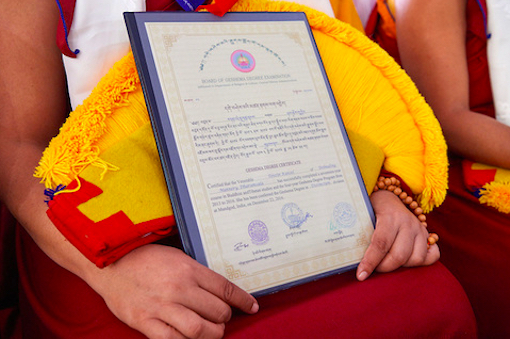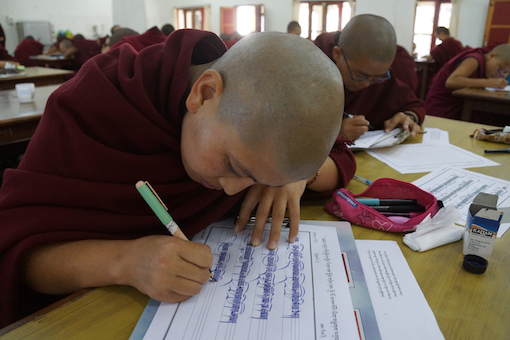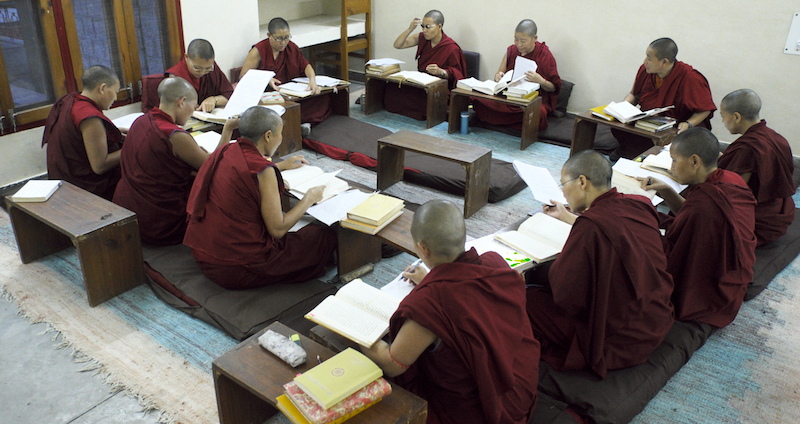This program is fully funded. Thank you!
The Tibetan Nuns Project has created a Geshema Endowment Fund to help ensure the long-term sustainability of the Geshema program.
The Geshema degree is the highest level of training in the Gelugpa tradition and is comparable to a doctorate in Tibetan Buddhist philosophy. This degree was only formally opened to women in 2012. To date, 44 nuns hold the Geshema degree.

Given the spike in coronavirus cases in India and Nepal, the Geshema Committee has decided to postpone this year’s exams from August 1st to October 1st. Photo of the 2019 Geshema exams courtesy of the Dolma Ling Media Nuns.
This degree enables Tibetan Buddhist nuns to become teachers, leaders, and role models. It makes these dedicated women eligible to assume various leadership roles in their monastic and lay communities reserved for degree holders and hence previously not open to women.
At the conclusion of their 17-year course of study, the nuns must successfully complete a 4-year series of examinations in order to attain the Geshema degree. The examinations, held each year in late summer, take place over a one-month period.
The Geshema Endowment Fund will help cover the costs involved in training and qualifying more Geshemas. This includes the costs of travel, food, and accommodation for the Geshema candidates to attend the exams. The fund will also cover the cost of administration and materials for the exams, including hosting meetings, couriering exam materials, and providing each new Geshema with a set of nuns’ robes and yellow hat that signifies the holding of the degree.
Our fundraising goal this year is $100,000, but we hope to raise $200,000 for the final fund.
Please help enable more Tibetan Buddhist nuns to become Geshemas!
- Make a gift online at tnp.org
- Call our office in Seattle, US at 1-206-652-8901
- Mail a check to The Tibetan Nuns Project (for the Geshema Endowment Fund)
815 Seattle Boulevard South #216, Seattle, WA 98134 USA - Give a gift of securities
- Leave a gift in your will to the Tibetan Nuns Project
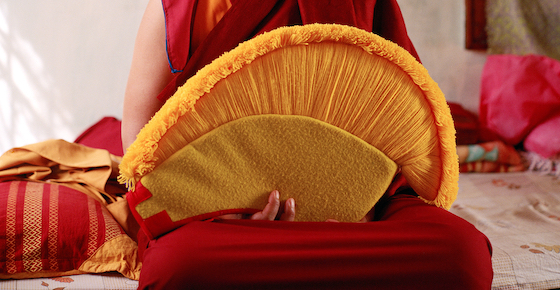
A Geshema holds the yellow hat that signifies her degree. Detail of photo by Olivier Adam.
Help Tibetan Buddhist Nuns Continue to Progress
With the goal in mind of educating and empowering nuns to become teachers and leaders, the Tibetan Nuns Project has fundraised for a number of years to endow the inter-nunnery debate session called the Jang Gonchoe. This annual event now brings together 400 to 600 nuns from 6 to 9 nunneries in India and Nepal for one month of intensive training in philosophical debate. The nuns debate key concepts from the philosophical texts they study as they progress towards the Geshema degree, the highest degree of their Tibetan Buddhist tradition. We have now been able to fully fund the Jang Gonchoe Endowment Fund, thereby ensuring that the annual inter-nunnery debate can continue for many years.
As the next step in helping the nuns reach the level of education they need to stand as equals with monks, we have created the Geshema Endowment Fund to ensure the future of the Geshema program.
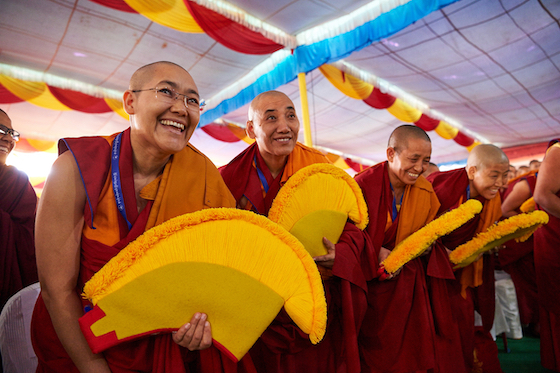
On December 22, 2016, His Holiness the Dalai Lama awarded 20 Tibetan Buddhist nuns with Geshema degrees at a special graduation ceremony held at Drepung Monastery in Mundgod, South India. Photo courtesy of Olivier Adam.
“Educating women is powerful,” says Rinchen Khando Choegyal, Founding Director and Special Advisor to the Tibetan Nuns Project. “It’s not just about books. It is also about helping nuns acquire the skills they need to run their own institutions and create models for future success and expansion. It’s about enabling the nuns to be teachers in their own right and to take on leadership roles at a critical time in our nation’s history.”
“Humanity needs this gender equity if we are to navigate perilous times ahead,” says Steve Wilhelm, a Tibetan Nuns Project board member. “The fact that growing numbers of women are achieving equality with men in the highest levels of Buddhist monasticism, by earning the equivalent of doctorate degrees, is joyous and of enormous importance to the world.”
Tibetan Buddhist nuns are making history and you can help them on this path. Following further study and exams in Buddhist Tantric Studies, the Geshemas are becoming fully qualified as teachers. In 2019, two of the Geshemas who graduated in 2016 were hired as teachers at Dolma Ling Nunnery and Institute.
The Geshemas are also beginning to take on leadership roles in their communities once held only by men. In 2020, a Geshema made history when she was appointed to be an election commissioner for the Tibetan government-in-exile elections.
Thank you for supporting the Geshema Endowment Fund and enabling more nuns to attain this high level of education.
Some Facts About the Geshema Degree
- The Geshema degree is comparable to a doctorate in Tibetan Buddhist philosophy.
- It is the highest level of training in the Gelugpa school of Tibetan Buddhism.
- The Geshema degree is the same as the Geshe degree for monks. The ending “ma” marks it as referring to a woman.
- Until recently, this highest degree could only be earned by monks.
- In 2011, a German nun, Kelsang Wangmo, who spent 21 years training in India, became the first female to receive the Geshema title.
- The historic decision to confer the Geshema degree to Tibetan Buddhist nuns was announced in 2012 by the Department of Religion and Culture of the Tibetan Administration, following a meeting of representatives from six major nunneries, Institute of Buddhist Dialectics, and the Tibetan Nuns Project.
- Candidates for the Geshema degree are examined on the entirety of their 17-year course of study of the Five Great Canonical Texts.
- To qualify to begin the Geshema process, nuns must score 75% or above in their studies to be eligible to sit for the Geshema exams.
- On December 22, 2016, His Holiness the Dalai Lama awarded 20 Tibetan Buddhist nuns with Geshema degrees at a special graduation ceremony held at Drepung Monastery in Mundgod, South India.

